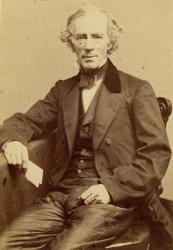Planning worship?
Check out our sister site, ZeteoSearch.org,
for 20+ additional resources related to your search.
- |
User Links
Search Results
PROVIDENCE
Appears in 2 hymnals Composer and/or Arranger: E. Leslie Tune Sources: Old German Incipit: 13555 15354 34234 Used With Text: I heard the robin singing
PROVIDENCE
I heard the robin singing
Author: Rev. Wm. Newell, D. D. Appears in 11 hymnals Used With Tune: PROVIDENCE
I heard the robin singing
Hier ist nicht uns're Heimat
Appears in 2 hymnals Used With Tune: [Hier ist nicht uns're Heimat]
Hier ist nicht uns're Heimat
I heard the robin singing
Author: Rev. Wm. Newell, D. D. Hymnal: The Morning Hour #77 (1896) Languages: English Tune Title: PROVIDENCE
I heard the robin singing
Hier ist nicht uns're Heimat
Hymnal: Frohe Lieder und Brüder-Harfe #130 (1898) Languages: German Tune Title: [Hier ist nicht uns're Heimat]
Hier ist nicht uns're Heimat
William Newell

1804 - 1881 Person Name: Rev. Wm. Newell, D. D. Author of "I heard the robin singing" in The Morning Hour Rv William Newell DD USA 1804-1881. Born at Littleton, MA, son of a storekeeper, his family moved to Boston when he was a child. In 1814 he entered the Latin School, graduating four years later. He wrote a lengthy poem for his graduation exercise and was accepted into Harvard, receiving a BA in 1824. He taught for a year at the Latin School, then entered Harvard Divinity School, graduating in 1828. Professor Andrews Norton, who took a lasting interest in him, said his literary acumen was unequaled. He was much consulted by men of letters as a result. After college, he traveled for several months, then accepted a pastorate at the First Parish in Cambridge. In 1830 he was ordained. In 1832 a new church was built by the college across the street. He began ministry there just after a large minority of worshippers had left the church to organize the Shepard Congregational Society. Controversy in the parish between orthodox and liberal members was bitter, and the minority protested against Newell as pastor. He refused to engage in controversy and ignored all hostility. As a result of his gentleness, the quarrel soon passed into oblivion. In 1835 he married Francis Boott Wells, and they had six children: William, Frances, Robert, Kirk, Louise, and Jane. His domestic life was a happy one. Harvard conferred to him his DD degree in 1853. He remained as pastor of the First Parish until his retirement in 1868. His congregation was very diverse, consisting of academic people, retired ministers, and common folk. Somehow he managed to please most everybody through his simple and direct sermons. He wrote Bible commentaries and much verse, but never tried to publish it. He had come to Cambridge in delicate health, but managed to labor as he wished until the last year of his life, when he developed a painful illness. However, he remained cheerful and content. He died at Cambridge.
John Perry
===================
Newell, William, D.D., b. at Littleton, Mass., Feb. 25, 1804, educated at Harvard, entered the Unitarian Ministry in 1830, retired in 1868, and died in 1881. In Putnam's Singers and Songs, 1874, there are 11 of his hymns and poems. His "All hail, God's angel, Truth" (Thanksgiving), is in Horder's Worship Song, with Tunes, 1905.
--John Julian, Dictionary of Hymnology, New Supplement (1907)
William Newell


 My Starred Hymns
My Starred Hymns

